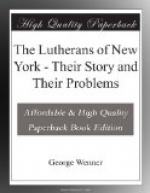After the use of Dutch in worship had ceased, German and English came into collision. It was a fight to a finish. When it was over there was little left for which to contend. When Pastor Kunze died, in 1807, the congregation had declined almost to the point of extinction. Many of the English-speaking families had left us and we thus lost some of our leading members, people whose ancestors had for five generations belonged to our communion. The Germans remained, but during the lull in the tide of immigration the use of German declined to such an extent as to imperil the existence even of the German congregation. When Kunze’s successor arrived he had difficulty in finding members of the church who could speak German. Even in the German congregation English had become the language of every-day life.
German thrives in German soil. Elsewhere it is an exotic not easily cultivated. From their earliest history Germans have had the Wanderlust and have sought for new homes as it pleased them. But wherever they go they amalgamate with their surroundings.
The Franks settled in Gaul, but, excepting its German name, the language retains but few indications of the German ancestry of a large part of the French people.
The Goths settled in Spain. Physical traits, blue eyes and blonde complexion, persist in some districts, but their descendants speak Spanish.
The Longobards crossed the Alps and settled in Italy where their children speak Italian, although Lombardy is just across the mountains, not far from the early home of their immigrant ancestors.
A notable exception to this tendency of the Germans
to amalgamate with other nations was when the Anglo-Saxons
invaded Britain. The island had been deserted
by the Romans, and the Germans refused for centuries
to ally themselves with the British inhabitants.
They retained their own language and customs with
but a slight admixture of alien elements.* To this
day after twelve centuries they prefer to call themselves
Anglo-Saxons rather than British. (Nomen a potiori
fit.)
"Philologically,
English, considered with reference to its
original form, Anglo-Saxon, and to the grammatical
features which it retains of Anglo-Saxon origin, is
the most conspicuous member of the Low German group
of the Teutonic family, the other Low German languages
being Old Saxon, Old Friesic, Old Low German, and other
extinct forms, and the modern Dutch, Flemish, Friesic,
and Low German (Platt Deutsch). These, with High
German, constitute the ‘West Germanic’
branch, as Gothic and the Scandinavian tongues constitute
the ‘East Germanic’ branch, of the Teutonic
family. (Century Dictionary under the word ’English.’)”
In the ninth and eleventh centuries the island was invaded by other Germanic tribes, directly by way of the North Sea or indirectly by the Channel from Normandy, and so the language was developed still further along English, that is Germanic lines. (According to the Century Dictionary the historical pronunciation of the word is eng’-glish and not ing’glish).




